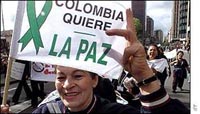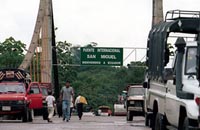U.S.
Military and Police Aid
- Focus on Arauca and Putumayo:Timeline
of Current Events Putumayo:
November
2003
November
29, 2003
 |
| Minister
of Defense, Ramirez, greets "Peasant Soldiers". |
It
has been a year since the "Peasant Soldiers" program
was set in motion by the Uribe administration, and so far it has
recived mixed reviews. In an article published by Colombia's daily
El Tiempo, Éder Sánchez of the National Association
of Peasants of Putumayo believes that in some cases the program
is not going well. "We had warned about this. The program
is a failure and should not go on."
The
biggest complaint in places like Puerto Guzmán and Puerto
Asís, in Putumayo; Tame and Puerto Rondón, in Arauca;
and Doncello and Montañita, in Caquetá; is that
a number of the peasant soldiers' families have had to leave the
areas due to threats from FARC and ELN. [Wilson
Fernando Vega, EL TIEMPO Suratá (Santander) http://eltiempo.terra.com.co/coar/noticias/ARTICULO-WEB-_NOTA_INTERIOR-1439282.html]
- FARC
 guerrillas
detained 20 technicians who were working to repair the pipeline.
The workers were intercepted by the FARC as they drove between
the municipalities of La Hormiga and San Miguel, close to the
border with Ecuador. According to reports, the insurgents forced
the workers out of their cars and proceeded to burn the cars.
[AFP]
guerrillas
detained 20 technicians who were working to repair the pipeline.
The workers were intercepted by the FARC as they drove between
the municipalities of La Hormiga and San Miguel, close to the
border with Ecuador. According to reports, the insurgents forced
the workers out of their cars and proceeded to burn the cars.
[AFP]
November
28, 2003
 The
FARC ignited a small bomb near Orito, leaving three dead and 3
more injured.
The
FARC ignited a small bomb near Orito, leaving three dead and 3
more injured.  Simultaneously,
in rural La Hormiga the FARC launched gas cylinder bombs leading
to mass panic among the population.
Simultaneously,
in rural La Hormiga the FARC launched gas cylinder bombs leading
to mass panic among the population.
The
Transandino pipeline was attacked and 34 of its wells were set
on fire. This has meant 150,000 dollars in daily losses for Ecopetrol.
Additionally,
the bridge over the Guamuez River, on the main road, is still
down after a guerrilla bombing. Eighty-five of its ninety-eight
meters have not been repaired due to the high costs and technicians'
fears of another attack.
November
25, 2003
 In
Villa Garzón, Luz Marina Benavides, president of the Comité
de los Derechos del Pueblo, was shot to death in her home. Her
death occurred on the morning of the day in which thousands of
Colombian women were scheduled to arrive in Villa Garzón
in a march commemorating the Day Against Violence Towards Women.
In
Villa Garzón, Luz Marina Benavides, president of the Comité
de los Derechos del Pueblo, was shot to death in her home. Her
death occurred on the morning of the day in which thousands of
Colombian women were scheduled to arrive in Villa Garzón
in a march commemorating the Day Against Violence Towards Women.
November 24, 2003
 |
On
November 25, marking the Day Against Violence Towards Women,
more than 3,000 women, belonging to the peace movement known
as "la Ruta Pacífica de las Mujeres", will
march to Putumayo. The march seeks to highlight the consequences
of war, the impact of aerial fumigation, and violations against
women in southern Colombia; and will call on the armed actors
to respect human rights and international humanitarian law
and demand that the Colombian state seek a negotiated solution
to the conflict and reassess the current anti-narcotics strategy.
[Actualidad Colombiana http://www.actualidadcolombiana.org/boletines/372.htm#a] |
El
Diario del Sur reported that alternative-development programs
carried out in Putumayo by Chemonics, with the funding of USAID,
have led to the manual eradication of 14,750 hectares of illegal
crops, the development of 14,836 hectares of legal crops and have
benefited 12,703 families in the area. This work has been carried
out in the municipalities of Mocoa, Puerto Guzmán, Villagarzón,
Puerto Caicedo, Puerto Asís, Puerto Leguízamo, Orito,
Valle del Guamuez and San Miguel and in more than 132 indigenous
areas. [El Diario del Sur (Pasto, Colombia) http://www.diariodelsur.com.co/noviembre/24/putumayo.php]
November
21, 2003
President
Alvaro Uribe publicly reprimanded the security forces for failing
to protect oil pipelines from guerrilla attacks, and ordered the
army to hunt down the guerrillas responsible. Additionally, he
ordered army and police forces to "massively capture the
terrorists in Putumayo."
Putumayo Governor-elect Armando Diaz said he was "deeply
worried" about the economic and environmental impact of the
attacks and called an emergency security meeting to assess the
damage to the oil installations and the environment. [Carlos
Gonzalez, Associated Press Yahoo! http://story.news.yahoo.com/news?tmpl=story&u=/ap/20031120/ap_on_re_la_am_ca/colombia_pipeline_attacks_1]
November
20, 2003
 |
Rebels
often attack the oil pipeline in Putumayo
Photo:
Garry Leech |
Leftist
rebels launched 30 attacks against the Transandino pipeline in
southern Putumayo, forcing a halt to production.
The
Colombian Minister of Mines and Energy,  Luis
Ernesto Mejía, confirmed the 30 attacks on the Transandino
pipeline, 18 attacks on wells, and other attacks on production
infrastructure. He added that the government will begin repairs
as soon as the Armed Forces clear the areas, but warned that "repairing
30 areas of the pipeline in addition to the other areas attacked
is going to 'take some time.'"
Luis
Ernesto Mejía, confirmed the 30 attacks on the Transandino
pipeline, 18 attacks on wells, and other attacks on production
infrastructure. He added that the government will begin repairs
as soon as the Armed Forces clear the areas, but warned that "repairing
30 areas of the pipeline in addition to the other areas attacked
is going to 'take some time.'"
So
far the environmental effects include a kilometer-long oil spill
that is affecting population and wildlife in the area. [CNE,
Presidencia de Colombia http://www.presidencia.gov.co/cne/2003/noviembre/20/10202003.htm]
 The
President's Office reported that more than 1,200 families in
the municipalities of Colón, San Francisco, Santiago
and Sibundoy in Upper Putumayo have decided to eradicate their
illegal crops and become a part of the Forest Ranger Program
financed by Plan Colombia.
The
President's Office reported that more than 1,200 families in
the municipalities of Colón, San Francisco, Santiago
and Sibundoy in Upper Putumayo have decided to eradicate their
illegal crops and become a part of the Forest Ranger Program
financed by Plan Colombia.
Next
week indigenous representatives from the area will arrive in
Bogotá to learn the details and commitments involved
when they sign collective contracts. The new "Forest Rangers"
will add to the 2,400 families in Orito already part of this
program.
So
far, 6,468 families throughout the country have signed on to
the program. The government's goal for 2003 is to have 12,000
families signed on and an additional 50,000 in 2004. [CNE,
Presidencia de Colombia http://www.presidencia.gov.co/cne/2003/noviembre/19/11192003.htm]
November
18, 2003
- Residents
of a small town in Putumayo have begun to charge a toll in order
to pave their local highway. The move came after president Uribe
told them there was no money in the budget to carry out the
project.
For
the last three months residents of Santa Ana, a small township
 in
Puerto Asís municipality, have set up a toll charging
all vehicles $2,000 pesos (less than a dollar) in hopes of paving
the road that leads to Puerto Asís, Orito and Caicedo.
in
Puerto Asís municipality, have set up a toll charging
all vehicles $2,000 pesos (less than a dollar) in hopes of paving
the road that leads to Puerto Asís, Orito and Caicedo.
While
they know this is illegal they refuse to do away with the toll.
Initially, the mayor of Puerto Asís did not agree with
the idea; after witnessing the strict control over the funds
and the progress of the work, however, he now supports them
with technical assistance and machinery. The goal is to finish
the local roads in three years. [PATRICIA ALEY,
EL TIEMPO]
- In
a massive crackdown
 against
corruption, President Alvaro Uribe fired an army general, Jorge
Pineda Carvajal, for the misuse of state funds. Prior to
being relieved from duty he commanded an elite anti-guerrilla
brigade in Putumayo. A Presidential Palace statement blamed
the firing of Pineda Carvajal on the "misuse of secret
state funds in 2001" at that time he was the head of the
army intelligence. [Reuters http://www.alertnet.org/thenews/newsdesk/N17378655.htm]
against
corruption, President Alvaro Uribe fired an army general, Jorge
Pineda Carvajal, for the misuse of state funds. Prior to
being relieved from duty he commanded an elite anti-guerrilla
brigade in Putumayo. A Presidential Palace statement blamed
the firing of Pineda Carvajal on the "misuse of secret
state funds in 2001" at that time he was the head of the
army intelligence. [Reuters http://www.alertnet.org/thenews/newsdesk/N17378655.htm]
November
10, 2003
 |
| Bridge
connecting Putumayo with Ecuador |
The
launching of a rocket in a failed assassination attempt against
the President of the Colombian Cattle Ranchers Federation, Jorge
Visbal, in Bogotá has led to a huge controversy between
Colombia and Ecuador. News sources reported that the rocket
used in the attack-allegedly by the FARC-was purchased from
Ecuador's military, leading to a tense exchange between the
presidents of both countries. An article published by the weekly
magazine Semana highlighted that "this controversy
has brought to light the reality that arms and weapons trafficking
from Ecuador by Colombian illegal armed actors is not new. It
is not a secret that the Amazon border is a strategic corridor
through which Colombia's insurgent groups acquire weapons."
"Three
months ago an investigation carried out by the Ecuadorian Attorney
Generals office and the Judicial Police revealed that two active-duty
and one retired military personnel were the alleged liaisons
for FARC weapons acquisitions."
According
to a former guerrilla, "Ecuador has become the center for
weapons black market for the insurgent groups that operate out
of southeastern Colombia. The arms industry's best customer
is the FARC".[Semana
magazine, ¿Cortina
de humo? ]


 Luis
Ernesto Mejía, confirmed the 30 attacks on the Transandino
pipeline, 18 attacks on wells, and other attacks on production
infrastructure. He added that the government will begin repairs
as soon as the Armed Forces clear the areas, but warned that "repairing
30 areas of the pipeline in addition to the other areas attacked
is going to 'take some time.'"
Luis
Ernesto Mejía, confirmed the 30 attacks on the Transandino
pipeline, 18 attacks on wells, and other attacks on production
infrastructure. He added that the government will begin repairs
as soon as the Armed Forces clear the areas, but warned that "repairing
30 areas of the pipeline in addition to the other areas attacked
is going to 'take some time.'"